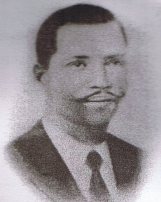
The Cameroon People's Democratic Movement is the ruling political party in Cameroon. Previously known as the Cameroonian National Union, which had dominated Cameroon politics since independence in 1960, it was renamed in 1985. The National President of the CPDM is Paul Biya, the President of Cameroon, while the Secretary-General of the RDPC's Central Committee is Jean Nkuete.

Martin-Paul Samba, born Mebenga m'Ebono, was a Bulu military officer during the Imperial German colonial period of Cameroon. M'Ebono became a favourite of the German colonials during his upbringing in Kribi, a coastal settlement in southern Cameroon. He was sent to Germany in 1891 to enter the German Military Academy; he was baptised Martin-Paul Samba while abroad. Upon graduation, Samba returned to Cameroon and accompanied German military expeditions across the colony.

Neukamerun was the name of Central African territories ceded by France to Germany in 1911. Upon taking office in 1907, Theodor Seitz, governor of German Kamerun, advocated the acquisition of territories from the French Congo. Germany's only major river outlet from its Central African possessions was the Congo River, and more territories to the east of Kamerun would allow for better access to that waterway.
The Pallottine Mission to Kamerun was a Roman Catholic mission to the German colony of Kamerun run by the Pallottines in the late 19th and early 20th centuries. When the German Empire became the colonial power of Kamerun in 1884, French Catholic groups were denied permission to set up a mission in the territory. The Germans were not eager to allow Catholics in at all, let alone foreign ones. They relented two years later when the German and Swiss-run Pallottines requested entry. Permission came with the following conditions: The Pallottines were not to compete directly with the already established Protestant Basel Mission, they were to accept no orders from any non-German authority, they were to employ only German or African staff, and they were to use and teach only the German language.

Rudolf Duala Manga Bell was a Duala king and resistance leader in the German colony of Kamerun (Cameroon). After being educated in both Kamerun and Europe, he succeeded his father Manga Ndumbe Bell on 2 September 1908, styling himself after European rulers, and generally supporting the colonial German authorities. He was quite wealthy and educated, although his father left him a substantial debt.

The Constitution of Cameroon is the supreme law of the Republic of Cameroon. Adopted in 1972, it is Cameroon's third constitution. The document consists of a preamble and 13 Parts, each divided into Articles. The Constitution outlines the rights guaranteed to Cameroonian citizens, the symbols and official institutions of the country, the structure and functions of government, the procedure by which the Constitution may be amended, and the process by which the provisions of the Constitution are to be implemented.
Emmanuel Mbela Lifafa Endeley was a Cameroonian politician who led Southern Cameroonian representatives out of the Eastern Nigerian House of Assembly in Enugu and negotiated the creation of the autonomous region of Southern Cameroons in 1954.
Kamerun National Democratic Party (KNDP) was a pro-independence political party active in Southern Cameroons during the period of British Mandate rule.

The Cameroonian Party of Democrats is a political party in Cameroon.

Parliamentary elections were held in British Cameroons on 24 January 1959. The result was a victory for the Kamerun National Democratic Party, which won 14 of the 26 seats in the House of Assembly.

The Cameroonian National Action Movement was a political party in French Cameroons.

The People's Front for Unity and Peace was a political party in Cameroon.

The Group of Cameroonian Progressives was a political alliance in Cameroon.

One Kamerun (OK) was a political party in British Cameroons.

The Socialist Party of Cameroon was a political party in Cameroon.
The Bamileke War, often known as guerre cachée, or the Hidden War, is the name of the independence struggle between Bamileke Cameroon's nationalist movement and France. The movement was spearheaded by the Cameroonian Peoples Union (UPC). Even after independence, the rebellion continued, shaping contemporary politics. The war began with riots in 1955 and continued after Cameroon gained independence in 1960. Following independence, the first President of Cameroon, Ahmadou Ahidjo requested continued French military intervention to fight the UPC rebels. The UPC rebellion was largely crushed by the Cameroonian Armed Forces and French Army by 1964. This war is often forgotten because it occurred at the height of France's biggest colonial independence struggle, the Algerian War.






